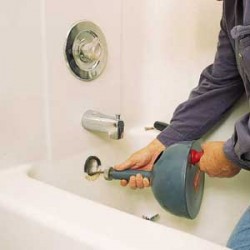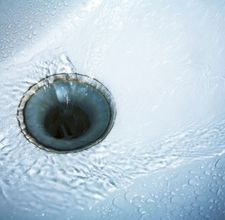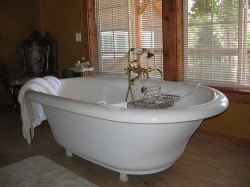Getting things stuck is cool if its related to love. And productivtiy. I mean, if you get stuck in an elevator with the one you love then things are bound to get… productive. Or would that be reproductive? LOL. Kidding aside, people generally don’t like being stuck. The same applies with drainage in your bathroom, whether it be regarding your toilet or shower/bathtub drain. It’s not cool at all to have something stuck in the pipes to obstruct the free flow of whatever it is that needs to flow.
That’s why I think it is very practical to learn about how to properly unclog pipes. Being a family person, it is very important to learn practical skills and crafts that would help the family on a regular basis. Unlike the skill of tile laying wherein you’ll probably be able to only use it once or twice in your lifetime, bathtub drains often get clogged every now and then. Think of all the money you’d be able to save with this general know-how of unclogging pipes, not to mention the awed looks of your children and spouse every time you perform this feat in front of/for them.
The Basics of How to Unclog a Bathtub Drain Naturally
Bathtub drains are special because they often get clogged up with weird materials. The things that clog drains are usually disgusting because they are just ordinary particles that get clumped up in huge quantities. In shower drains, the usual culprit is hair that accumulates into great big bunched up balls. This occurs because hair often falls when we shower and it is not properly cleaned so it gets into the drainage.
Bathtubs are worse because there is stagnancy in the water used to bathe. If the person came from a really muddy field and bathed in a bathtub, the particles of dirt would also accumulate and be possible clogs to the drain. Bottom line: everything that would accumulate from bathing would be possible clog candidates. In small doses they may not mean anything, but having to clean them when the drain gets clogged is an entirely different thing because it gets complicated and utterly disgusting to unclog.
How to Unclog a Bathtub Drain and the Materials you Might Need to Do It
The common tool to use is a plunger when trying to unclog pipes. It can work on toilets and drains because of the suction action it does to try and get out the particles or objects stuck. For bathtubs, the trick to getting the drainage unclogged is by making sure there is some standing water in the bathtub. That, or you can put some hot water to make sure that the plunger properly sucks the particles out of the pipes. Another tool that professional plumbers use is a snake, which is a metal spring with a crank on one end. A snake can be lowered into a drain to remove particles and objects stuck between. Either one is of course less expensive than hiring a professional plumber.
Another way to unclog pipes, although I don’t usually agree with this method, is by using chemical drain cleaners. These materials are effective in eroding the small stuck particles, whittling them down so that they could be easily flushed with a torrent of water. Tough chemicals, however, are inadvisable for long term use because they tend to damage the pipes and cause more trouble in the long run. I wouldn’t count so much on chemicals though if I were you.
A Final Word on Unclogging Bathtub Drains
It would be very beneficial for any home to have a handy man at the ready who can fix pipes at the drop of a hat. Learn more about basic plumbing by reading up on self-help books on the matter or by looking it up online. The internet is a convenient tool because it provides so much information on a lot of things that people wouldn’t normally have access to a few years back. Within a week of intensive reading, you might even be knowledgeable enough to practice plumbing as a profession. All you’d need now is actual experience – get your hands dirty, so to speak.
The choice is yours, either spend on professional plumbing every time you have a problem or learn sufficiently on the matter so you can solve the problem by yourself. I’d personally choose the latter because it is more practical and, quite frankly, fulfilling. Tell me what you think or share your plumbing stories by leaving a short paragraph on the comments section below.



















